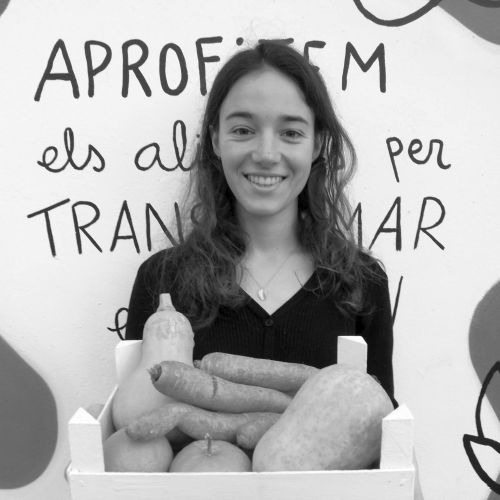The industrialised agri-food system is unsustainable. The very agents promoting this model are beginning to look for ways to avert its collapse. Gleaning that avoids food waste is a starting point for a more sustainable model.
One of the most visible aspects of the unsustainability of the current food model is food loss and waste. According to the United Nations’ Food and Agriculture Organisation (FAO), one-third of food worldwide is lost or wasted along the chain that stretches from farms to our tables. One might believe this is happening in other parts of the world, but studies focused on Europe estimate that more than 87 million tonnes of food are wasted each year along the entire agri-food chain. This corresponds to 173 kg per person per year.[1] If we consider that, on average, we eat 2.3 kg of food a day, this waste means throwing away food for 75 consecutive days. The greatest waste applies to fruit and vegetables: 46% of food waste generated in Europe is precisely fruit and vegetables. In fact, of the total fruit and vegetables available, 41% and 46%, respectively, are discarded along all the links: primary sector, industry, distribution and consumption.[2]
A structural problem, complex solutions
There are manifold causes behind this phenomenon, many of which are interrelated. On the one hand, certain individual and daily practices can be identified. Responsibility, however, cannot fall entirely on individuals and their habits and behaviours, as this issue has structural causes that exacerbate it. Trade dynamics, certain regulations and globalised production and marketing systems play a major role in waste generation, and are at the root of the problem. So, if the problem is complex and structural, tied to the production and consumption patterns of plentiful societies, we cannot expect the generation of new technologies or the application of pieces of advice — such as planning household purchases — to change the current scenario by themselves. To bring about systemic change, it is imperative we promote a new concept of food in its broadest sense. Food and farming must retrieve their value, the food sovereignty of every municipality must be promoted and agro-ecological promotion processes must be supported. It is only through this change of understanding that food loss and waste will be reduced, and a more sustainable, resilient and equitable agri-food system will be built.
[1] Stenmark et al. Estimates of European food waste levels. European Commission, 2016.
[2] Caldeira et al. Brief on food waste in the European Union. European Commission, 2020.
It must be generated short-term actions that strive to reduce food loss and waste cannot be generated and that, in parallel, promote the right to healthy and sustainable nutrition.
The right to healthy and sustainable nutrition
It is not inconsequential that food loss and waste are identified with the right to sustainable and healthy nutrition. There is a lack of specific data on this reality, but in Spain, one in five people live below the poverty line and one in four is in a situation of social exclusion, a situation that tends to result in limitations to their diets. The existence of these two parallel realities is, to say the least, paradoxical. Both are the outcome of the unsustainability of the current agri-food model, but it should be noted that there is no causal relationship between them. Thus, ending food loss and waste would not directly involve guaranteeing the right to sustainable and healthy nutrition for everyone, and vice versa.
To bear an impact on both issues, the adoption of a broad and cross-cutting perspective is needed. A good example is the Milan Urban Food Policy Pact. The ensuing actions demonstrates the need to promote models that eschew welfarism in terms of guaranteeing the right to healthy and sustainable food. This area, very much characterised by traditional charity, calls for the creation of new models based on equity, empowerment and dignity. This does not mean, however, that short-term actions that strive to reduce food loss and waste cannot be generated and that, in parallel, promote the right to healthy and sustainable nutrition.
The chief mission of the Espigoladors Foundation is to contribute to the fight against food loss and waste.
Waste prevention initiatives
There are several solutions that can be implemented to reduce food loss and waste. Some of these act at individual level, such as proper food preservation, trash cooking and mindful and responsible consumption. Nevertheless, as we pointed out above, a problematic structure calls for collective solutions that involve various agents: agri-food agents, social organisations, research bodies and institutions.
In the metropolitan region of Barcelona, some of the most widely implemented projects have emerged from social organisations. Examples are the Plataforma Aprofitem els Aliments [Zero Food Waste Platform], Pont Alimentari [Food Bridge] and La Nevera Solidària [Solidarity Fridge], among others. Most of these organisations work to reduce waste in distribution and households, and many of them also endeavour to promote access to healthy nutrition.
The Espigoladors Foundation is a non-profit organisation set up in 2014 that is part of the network of organisations in the agroecology and social entrepreneurship division of Catalonia’s food sector. Its chief mission is to contribute to the fight against food loss and waste, to guarantee the right to healthy nutrition and to generate job opportunities for groups in vulnerable situations. The activity that gave its name and that became the starting point for the initiative is espigolament [the Catalan word for “gleaning”]. This practice entails collecting, with the agreement of local producers and the cooperation of volunteers, fruit and vegetables that have been removed from the commercial circuit for various reasons (due to falls in demand, aesthetic reasons or drops in prices received by farmers, among others). All the food recovered is distributed to social organisations and free food distribution points that work to ensure access to healthy nutrition for vulnerable groups.
Gleaning will never be the ultimate solution to food loss in the fields, but it is a far-reaching action to address many of the symptoms of an ailing agri-food system.
Gleaning to shift gears
Gleaning will never be the ultimate solution to food loss in the fields, but it is a far-reaching action to address many of the symptoms of an ailing agri-food system. On the one hand, it is an act of condemning farmers’ living conditions and viability. On the other hand, it strengthens the connection between urban and rural areas: it is often how many people go to farms for the first time and become mindful of the origin of food and the work executed by the primary sector. It is also a means of bringing to light the environmental and social problems of losses in the fields, providing figures and revealing the causes with a view to coming up with solutions. Finally, the communal nature of gleaning should be underlined: over four hours of volunteering, a unique space for coexistence is created between people with different life stories who share a unique experience of direct contact with the soil and nature. In this way, the understanding that food is inextricably linked to both individual and planetary health will be fostered.
In 2021, Barcelona is the World Capital of Sustainable Food, a good opportunity to continue adding initiatives and to strengthen existing ones that propose new ways of understanding nutrition and everything this implies. The series of debates and activities that shall take place will be an opportune time to reflect on how to mainstream the initiatives and models that reverse today’s situation.
The newsletter
Subscribe to our newsletter to keep up to date with Barcelona Metròpolis' new developments





